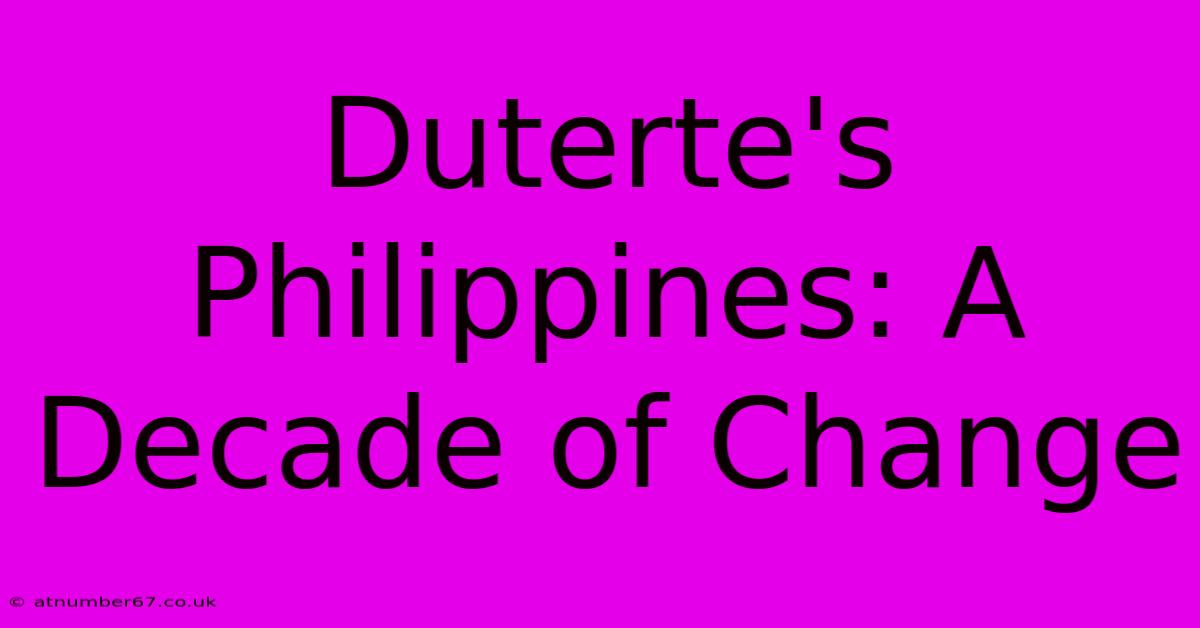Duterte's Philippines: A Decade Of Change

Table of Contents
- Duterte's Philippines: A Decade of Change
- The "War on Drugs" and its Controversies
- Impact on Crime Rates: Fact vs. Fiction
- Infrastructure Development: "Build, Build, Build"
- Economic Impacts and Challenges
- Foreign Policy Shifts and Regional Relations
- Social and Political Reforms
- Conclusion: A Legacy Under Scrutiny
Duterte's Philippines: A Decade of Change
Rodrigo Duterte's presidency (2016-2022) marked a significant turning point in Philippine history. His six-year term was characterized by a distinctive approach to governance, leaving an undeniable and complex legacy on the nation. This article examines the key aspects of his administration, exploring both the achievements and criticisms that define his time in office.
The "War on Drugs" and its Controversies
Duterte's campaign promise to eradicate illegal drugs through a relentless "war on drugs" became a defining feature of his presidency. This campaign, however, was met with widespread international condemnation due to its high death toll and allegations of extrajudicial killings. Human rights organizations documented numerous cases of summary executions, raising serious concerns about due process and the rule of law. While the government maintained the killings were justified as part of legitimate law enforcement operations, the controversy remains a significant stain on his legacy. The human cost of this campaign continues to be debated and investigated.
Impact on Crime Rates: Fact vs. Fiction
The administration frequently cited a significant decrease in crime rates as evidence of the war on drugs' success. While crime statistics did show a decline during this period, attributing this solely to the controversial campaign is difficult. Other factors, such as improved policing strategies and increased surveillance, likely contributed to the reduction in crime. Independent verification and analysis of the data are crucial to understand the true impact.
Infrastructure Development: "Build, Build, Build"
A cornerstone of Duterte's administration was the "Build, Build, Build" infrastructure program. This ambitious plan aimed to modernize the country's infrastructure through a massive investment in roads, bridges, railways, and other projects. While some projects were completed and brought tangible improvements to transportation and connectivity, others faced delays, cost overruns, and controversies related to transparency and procurement. The long-term effectiveness and sustainability of these projects remain to be seen.
Economic Impacts and Challenges
The "Build, Build, Build" program, along with other economic policies, aimed to boost economic growth. While the Philippines experienced relatively high GDP growth during parts of Duterte's term, challenges such as income inequality and poverty persisted. The extent to which these infrastructure projects contributed to overall economic improvement requires further analysis. The impact on various sectors, particularly tourism and agriculture, also deserves deeper investigation.
Foreign Policy Shifts and Regional Relations
Duterte pursued an independent foreign policy, pivoting away from traditional alliances with the United States and strengthening ties with China. This shift involved increased economic cooperation with China, including substantial investments in infrastructure projects under the Belt and Road Initiative. However, this closer relationship with China came at a time of increasing territorial disputes in the South China Sea, raising questions about the Philippines' sovereignty and its long-term strategic interests. Balancing the benefits of economic cooperation with the protection of national interests remains a complex challenge.
Social and Political Reforms
Beyond the "war on drugs" and infrastructure projects, Duterte's administration implemented various social and political reforms. These included measures aimed at improving healthcare, education, and social welfare. However, the impact and long-term effectiveness of these reforms need to be assessed. The administration also faced criticism for its handling of press freedom, with allegations of intimidation and censorship of journalists. The overall effect on democratic institutions and civil liberties is a subject of ongoing debate.
Conclusion: A Legacy Under Scrutiny
Duterte's presidency undeniably left a significant mark on the Philippines. While his administration achieved progress in certain areas, such as infrastructure development, the controversies surrounding the "war on drugs" and the implications for human rights continue to cast a long shadow. A comprehensive understanding of his legacy requires a thorough and objective analysis, acknowledging both the achievements and the serious concerns that arose during his tenure. The long-term consequences of his policies continue to unfold, shaping the political, social, and economic landscape of the Philippines. Further research and independent evaluations are crucial for a complete and nuanced understanding of this transformative period in Philippine history.

Thank you for visiting our website wich cover about Duterte's Philippines: A Decade Of Change. We hope the information provided has been useful to you. Feel free to contact us if you have any questions or need further assistance. See you next time and dont miss to bookmark.
Featured Posts
-
Harper Beckham S Secret To A Happy Family Life
Mar 31, 2025
-
Jan Stenbeck Net Worth And Investment Strategies
Mar 31, 2025
-
Zahide Tiktok Age The Deep Dive
Mar 31, 2025
-
Alevilere Hakaret Celebrating Diversity
Mar 31, 2025
-
Christina Riccis Daughter The Woman Behind The Name
Mar 31, 2025
